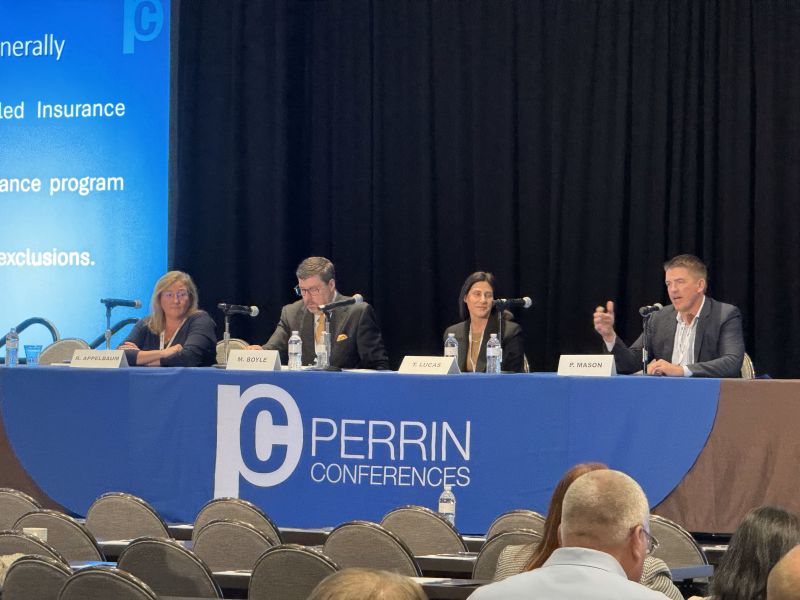Happy Holidays!
Permalink
Multi-Million-Dollar Federal Court Subrogation Matter Settled
PermalinkCongratulations to Senior Trial Counsel, Brian Franklin and Nicola Duffy on recently settling a multi-million-dollar federal court subrogation matter involving a massive fire at a girl’s camp in upstate New York. 👏👏
The fire broke out in the Camp’s commercial kitchen as cook staff left a large quantity of meat unattended on a char broiler, open flame.
The fire suppression system installed in the cooking hood allegedly failed to operate, and the fire spread to the roof, eventually causing the complete destruction of the commercial structure.
gartner + bloom, P.C. representing the installer of the fire suppression system, demonstrated through its team of experts that the fire’s spread was not the result of an inoperable suppression system, but rather defects in the commercial structure and the original installation of the hood.
The team further found evidence that the suppression system had been tampered with.
The matter was successfully resolved, for a fraction of the original demand, saving the client from a large potential exposure.
Cheers to Brian Franklin & Nicola Duffy on delivering a phenomenal outcome for our client🥂💜🥂

Congrats to New Partner Peter Rosenberg, Esq.
Permalinkgartner + bloom, P.C. is pleased to celebrate the recent promotion of Peter Rosenberg to Partner. Peter has been a formidable litigator who delivers impressive outcomes for clients in our transportation practice. We look very much forward to your continued success and working with you for decades to come. Cheers to you, Peter! 👏👏👏

Congrats Nicolas A. Wyatt, Esq.
Permalinkgartner + bloom, P.C. proudly celebrates and extends a warm congratulations to Nicolas A. Wyatt, Esq. on his recent induction to the Bar. Cheers to you, Nicolas🥂from all of us on this incredible milestone👏👏👏

Gartner + Bloom a Sponsor at 2024 National Construction Defect Conference
PermalinkWe are proud to be a sponsor at the Perrin Conferences 2024 National Construction Defect Conference in New Orleans this week.
Presentation at National Construction Defect Conference
PermalinkClosing out Day One with a panel on Demystifying Indemnity, Liability, and Risk Management: Join Rebecca Appelbaum, Esq., Mark Boyle, Esq., Tara Lucas, and Paul Mason as they explore key topics including risk transfer, builders’ risk, and controlled insurance in construction defect cases.
Thank you to everyone who attended Day One of the National Construction Defect Conference!

Phenomenal Outcome in a Mediated New York Labor Law Matter
PermalinkCongratulations to Partner, Narri Subrati on a phenomenal outcome in a mediated New York Labor Law matter.
The Plaintiff was an elevator mechanic installing call button boxes at an under-construction storage facility. The Plaintiff stepped out of the elevator shaft at a mezzanine level where there was no floor/decking causing the Plaintiff to fall approximately 8 feet onto a concrete floor. The plaintiff’s alleged injuries included fracture of the left side nasal bones, concussion, traumatic brain injury, right shoulder surgery, and cervical and lumbar herniations.
The case had been pending in Kings County and was set for trial. Ms. Subrati defeated Plaintiff’s motion for summary judgment on the Labor Law 240(1) cause of action on a question of fact even though the trial and appellate courts found that Plaintiff established he was engaged in a work activity that falls within the ambit of Labor Law 240(1); defeated a summary judgment motion of the owner for indemnity; and defeated the employer’s motion to dismiss the indemnity Complaint.
There were multiple appeals which ended in a draw, and finally positioned this case for expedient resolution. Additionally, there was a declaratory judgment action against the employer’s insurer who refused to assume the defense of the general contractor as an additional insured. Ms. Subrati’s motion for summary judgment against the employer’s carrier was granted by the trial court, and that decision affirmed on appeal by the First Department.
The plaintiff’s demand at the mediation was in the multimillions. Narri’s zealous advocacy combined with her motion resulted in a favorable settlement representing a fraction of the “settlement value” of the case.
Cheers to you Narri on driving an outstanding outcome!

Summary Judgment Dismissing Complaint Against Construction Client
PermalinkCongratulations to Miriam Miller Esq on obtaining a summary judgment dismissing the Plaintiff’s Complaint against our firm’s construction client!
Summary Judgement was granted in New York Supreme Court for our client, a curtain wall contractor, in a complex bodily injury construction case. Plaintiff asserted five causes of action for: common law negligence; negligent hiring and supervision; vicarious liability for assault and/or battery; intentional infliction of emotional distress; harassment and discrimination.
Miriam Miller Esq and her team including Austin LaBorwit, Esq. successfully argued that our client bore no liability since Plaintiff’s accident occurred in front of the construction site and our client owed no duty towards Plaintiff, an employee of our subcontractor.
Furthermore, we also indicated that since the incident occurred outside of the workplace and had no relationship to the work under the contract, any claims for indemnification are fatal, since the contract with the Ownership entities explicitly limited indemnification to injuries within the scope of work.
The court also agreed with our argument that since our client did not employ Plaintiff, nor the other laborers at the Project, who committed the assault , it did not have a duty to institute specific procedures for hiring employees for any of the subcontractors or a duty to investigate any violent propensities of the subcontractor’s employees at the site, unless the client was on direct notice to investigate the subcontractor and its employees, which was absent in our case. As such, our client could not be held vicariously liable for Plaintiff’s accident.
Another impressive win for Miriam Miller Esq and Austin LaBorwit, Esq. 🏆Cheers🏆

Autumn Harvest Celebrations & Festivities
PermalinkEarlier this week, the gartner + bloom, P.C. team got together for Autumn harvest celebrations and festivities. Nothing like good folks, food and fun time cheer🍻

Staff Cruise for 30th Anniversary
PermalinkEarlier this week, the gartner + bloom, P.C. team set sail aboard the Skyline Princess yacht for a magnificent cruise around the NY harbor to celebrate the firm’s 30th anniversary milestone. The drinks flowed and the chips rolled…to the beats of our salsa and hip hop dance party. Cheers🥂to all for a magical evening!






